
With the arrival of ChatGPT and other large language models, or LLMs, in 2023, the campus faculty and administration amped up the conversations about the pros and cons of artificial intelligence and what it means to education. This included individual faculty and departmental consultations and multiple campus-wide events hosted by the Wally Cordes Teaching and Faculty Support Center.
The TFSC has been working closely with campus partners, such as the Teaching Innovation and Pedagogical Support initiative and the Office of Academic Initiatives and Integrity to ensure that faculty are informed and supported regarding these programs.
Last semester, TIPS and the Office of Academic Initiatives and Integrity held a session, "Faculty Session on ChatGPT: Assessments, Assignments, and Academic Integrity" by Chris Bray, Chris Bryson and Kathryn Zawisza. The Teaching and Faculty Support Center also hosted the end-of-the-semester faculty reading day event on LLMs with "Teaching: In the Age of Artificial Intelligence."
In addition, many individual instructors and academic departments requested consultations with representatives from TIPS and the Office of Academic Initiatives and Integrity to learn more about the technology, brainstorm ways it could be integrated within their courses, and address potential issues of academic dishonesty. These consultations are still available upon request.
Chris Bryson, executive director of the Office of Academic Initiatives and Integrity, said, "We did experience an uptick in academic dishonesty cases related to the use of generative artificial intelligence towards the end of the spring 2023 term, and we will be here again this semester to assist faculty in addressing their concerns as they arise. Given the broad range of approaches towards generative artificial intelligence among faculty on our campus, I would encourage instructors to define their expectations within their syllabi and talk about this in class. Students are most definitely seeking this type of guidance and engagement from their instructors."
The Office of Academic Integrity is informing students during orientation that it is important to obtain permission to use artificial intelligence from their instructor(s) prior to using it, otherwise it could result in an academic dishonesty violation. All students and faculty are responsible to make themselves familiar with the University of Arkansas' Academic Integrity Policy.
At TFSC Teaching Camp this year, a nationally known speaker, Jose Antonio Bowen presented a workshop "Leveraging Artificial Intelligence in the Classroom." In that session, faculty were encouraged to try a variety of artificial intelligence tools and to design assignments to use those tools. Co-director Lynn Meade said, "Many faculty were surprised to find that there were some creative uses for artificial intelligence that they might use in their classes. Others were delighted to find that there were ways they could use it to help with their own workload." Dr. Bowen stressed that students may be expected to know how to use artificial intelligence as a tool in their future careers and he challenged faculty to consider options about how they might use it in their classes to teach students how to use it properly. He allowed faculty to discuss the pros and con of teaching students to use the technology on assignments and suggested the importance of faculty having a clear policy regarding use of AI in the classroom.
At camp, faculty were warned not to run student work through outside AI detection software. Unless faculty use the university system, it can be a FERPA privacy concern. Any faculty member with concerns about the use of AI on an assignment can reach out to honesty@uark.edu for advice.
Faculty can find a compiled list of resources on tips.uark.edu under What is Chat GPT? These resources include topics such as Academic Integrity and Chat GPT,Citing AI-Generated Text, Chat GPT Example Course Syllabus, Assignments to Discourage Generative AI Usage, and Assignments Leveraging Generative AI Tools.
Additional sessions are already in the works for the fall semester to keep the conversation going about the use of artificial intelligence.
Outside of individual consultations with TIPS and OAII, there are already more opportunities planned for the fall specific to artificial intelligence:
-
Wednesday, Sept. 13, from 6:30-7:30 p.m. in Vol Walker Hall 250, during this year's Academic Integrity Week, the incoming ASG President Cael Losenneger, and ASG Vice President, Hailey Hoog, will serve on a panel alongside UARK faculty members, Dr. Jason Endacott and Dr. John Gauch, to discuss the implications of ChatGPT and generative AI for students and faculty.
-
On Thursday and Friday, Sept. 21-22, the TFSC will host a student panel discussion at the Not so New Faculty Lunch focused on the use of technology in their courses, how technology can lead to academic integrity concerns, and how faculty members can better reduce academic integrity concerns related to technology usage.
-
Key campus faculty are also joining with other SEC schools to take the "Teaching with AI in the SEC" course to better understand the uses, limits, and problems with AI in the classroom. The eight-module course covers topics including introductory concepts and terms, academic integrity, course and assignment design, ethics and legal issues, the use of AI tools to enhance student learning, partnering with students on these important topics, developing or refining teaching philosophy statements, and leading conversations in departments and academic programs on topics related to artificial intelligence.
Topics
Contacts
Lori Libbert, HEI Program coordinator
Wally Cordes Teaching and Faculty Support Center
479-575-3222, tfsc@uark.edu